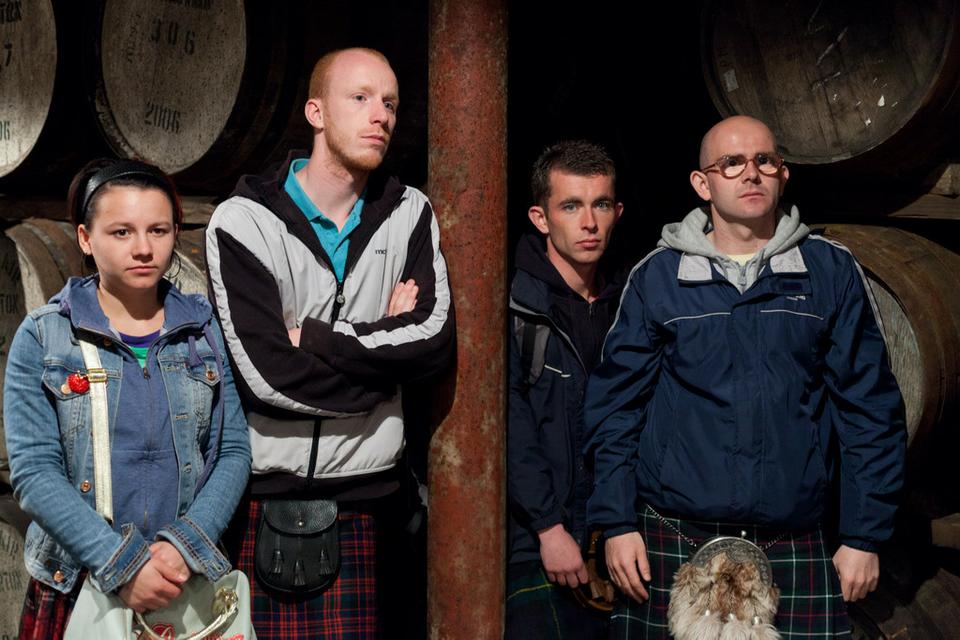
News
Summers Will Not Finish Semester of Teaching as Harvard Investigates Epstein Ties

News
Harvard College Students Report Favoring Divestment from Israel in HUA Survey

News
‘He Should Resign’: Harvard Undergrads Take Hard Line Against Summers Over Epstein Scandal

News
Harvard To Launch New Investigation Into Epstein’s Ties to Summers, Other University Affiliates

News
Harvard Students To Vote on Divestment From Israel in Inaugural HUA Election Survey
"The Angels' Share" A Visual Delight
The Angels' Share –- Dir. Ken Loach (Entertainment One) –- 3.5 Stars

“Your record is appalling. For much of your short life you have behaved like a thug.”
With these unpromising words the grave voice of the judge sums up the case of Scotsman Robbie (Paul Brannigan). In court again for charges of violent assault, after months of peace with a girlfriend (Siobhan Reilly) who will be due with their first child soon, Robbie looks to be caught again in the rough life he has tried to amend. This is a dark premise, but “The Angels’ Share,” the latest so-called social realist film by celebrated English director Ken Loach, turns out to be a by turns rude, heartening, and exquisite comedy.
Robbie’s fellow accused have been summoned prior to his case, one by one, for their crimes against humanity. There is Albert (Gary Maitland), a bald, bespectacled man accused of disrupting public transportation by accidentally falling off the platform before a coming train, who is unlike Robbie in that he only constitutes a threat to civilized society by virtue of his “profound stupidity.” There is Mo (Jasmin Riggins), a female kleptomaniac accused of making off with a pet shop animal and calling her arresting officer a “grumpy twat,” and Rhino (William Ruane), who has urinated on and variously defaced the statues of public dignitaries. Robbie, the endnote to this train of miscreants, is sentenced to community service instead of jail time and given a final chance.
From here, the plot becomes implausible and undercooked. On a trip to a distillery, the group learns of the famous Malt Mill cask, which houses the rarest, most expensive whiskey in the world. A certain amount is expected to simply evaporate from a sealed whisky cask—the angels’ share, said to be for the guardian spirits that watched over the aging mix. Robbie, who has conveniently just discovered his world-class gift for discerning whisky flavors, sets out with his convict friends to claim an angels’ share, an indiscernible amount, of the Malt Mill. Selling even one bottle would give them all enough money to start new lives. Never mind that Robbie’s got a neighborhood thug stalking him with death threats—halfway through the movie, after Robbie puts a knife to his throat and tells him to stop ruining his life, the film’s only villain politely complies and speeds away on a motorcycle, taunting him like a schoolboy. That was easy! As far as “social messages” go, this film is standard feel-good: good guys win because the cream always rises to the top, never mind how inexplicably.
What is most important about the film’s structure in this case is not how well it holds together—it doesn't—but rather how it presents scenarios to let its actors shine. The excellent acting in this production is especially impressive given that, for many of the cast members, it is their breakout piece. Brannigan’s small, expressive face, a long scar trailing down the left cheek, displays an impressive range of emotions in the film: he looks lovingly at his newborn son, he rages, he talks charmingly, he says nothing at all and looks pensively out the bus window through the miles of Scotland countryside. Gary Maitland’s baudy character, Albert, is delightfully obscene and frequently gives some of the funniest (if most offensive) lines: when he gets on a bus full of nuns, a startled Albert says, “Fuck me, ‘Sound of Music’!” Ruane and Riggins are both lively and fun as supporting actors. Another standout performance was that of John Henshaw as the rugged overseer of the cleaning convicts, whose almost paternal concern for Robbie is the most moving of the human relationships in the film.
The cinematography is a real treat for the eyes, a visual whiskey tasting of colors, textures, and terrains. As you can expect in any Loach film, there is no shortage of vividly rendered scenery. En route to the Malt Mill, the gang coasts on a bus through the watery Scottish landscape with its quaint European road signs. The cold, pale blues of the earlier settings are succeeded by the warm, earthy tones in the wine distillery and the wood of the casks and the deep pungent greens of the wet grass in the highway, a transition that reflects Robbie’s brightening prospects. Glowing images, from the elaborate swollen pipes in the distillery to the crisp cobblestones in the street, are in themselves inspiring reminders of the rich comedy and promise of life.
None of its lazy plotting ultimately prevents “The Angels’ Share” from being a cheering tale of redemption, provided the audience is willing to suspend its disbelief and just have a good time. Its fine flavor of comic experience, riotous in its acting and subdued in its camerawork, more than compensate for the rest.
—Staff writer Victoria Zhuang can be reached at vzhuang@college.harvard.edu.
Want to keep up with breaking news? Subscribe to our email newsletter.
